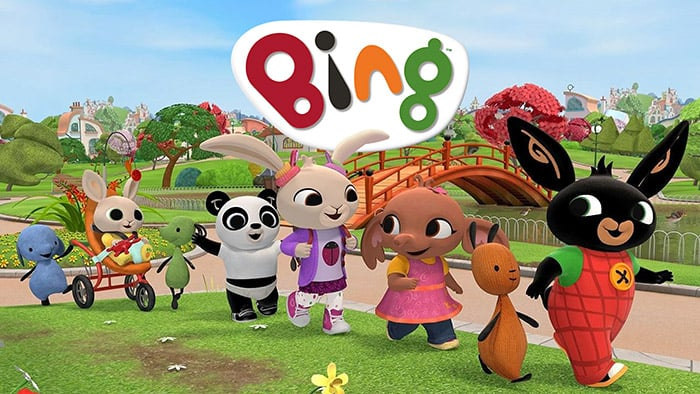December 4, 2024 Hullo
Cornucopia mechanismI forgot ClangersAMA For Love But I Won’t Do That Part 2Links
Bye
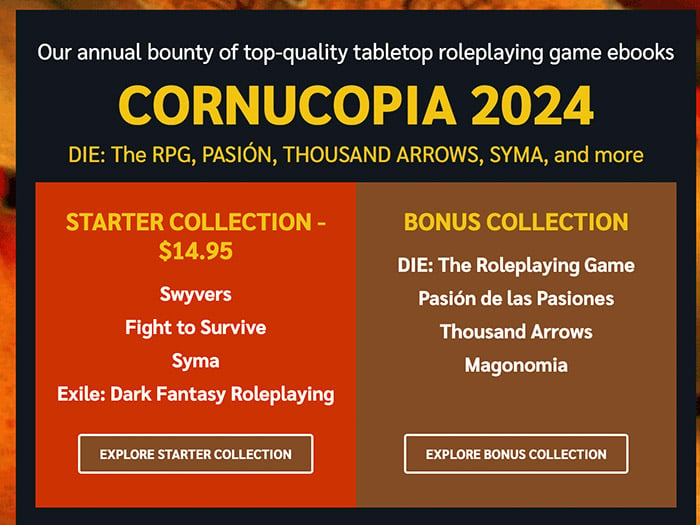
This is probably one ticks off a very weird, specific nerdy bucket list. You’ll likely have noticed that I link to Bundle of Holding sales a bunch – if you’re interested in tabletop rpgs, it’s basically the best way to get hold of a whole load of stuff. Anyway, every year they do a Cornucopia of various games circa-Thanksgiving.
And I’m in this one. Look!
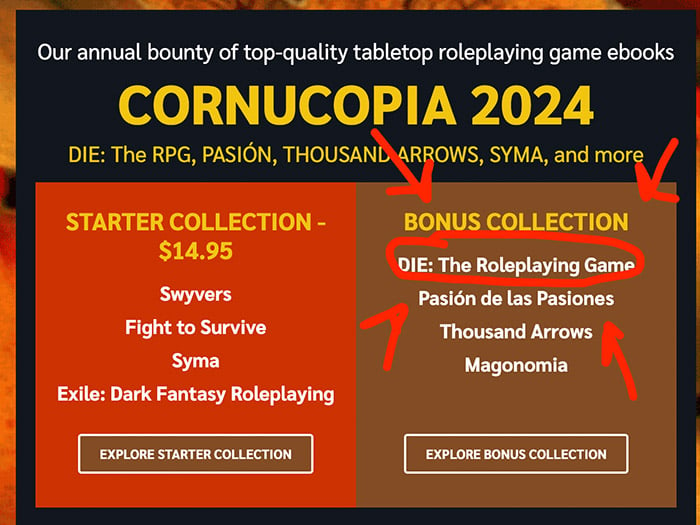
It’s up for another week, so do consider backing if you haven’t got a copy of DIE RPG yet (for those who are solely comics folks, there is a short Stephanie story in it, plus a bunch of new art from her, and the Bestiary is good deonstructionary stuff for anyone). Hell, consider it anyway – there’s an amazing selection of stuff alongside DIE RPG. Consider sleazy-thief game Swyvers, telenovella-game Pasión de las Pasiones and warring-states-’em-up Thousand Arrows. And that’s only the three I own.
I have no comics out this week, I think, so feel free to buy other people’s, or my own, if you haven’t already. I’m not fussy.
I’ve had various folks ask me to write more about the media I’ve been consuming across the last couple of years. This is for you.
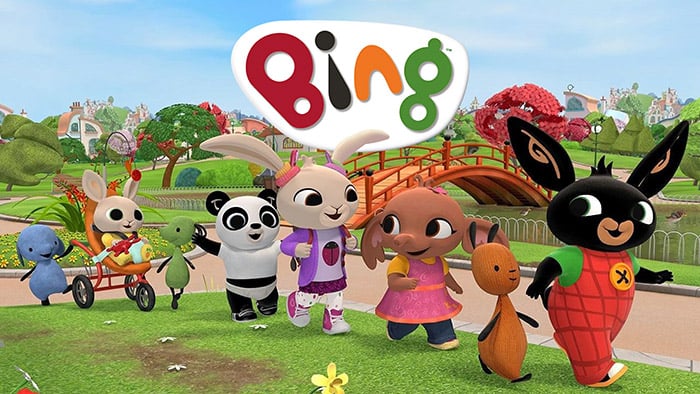
Bing is relentlessly comforting show about the eponymous rabbit, his various friends and their carers – who are animated sack puppets. This sensitive creative choice is the result of knowing “not everyone is cared for by a parent” so making these tabula rasa to which you can map whatever people who love and care for you… but to an adult watching, you spend a lot of time wondering what situation led to Bing being left with these monstrous creatures. Are they aliens? Robots? Have they kidnapped all the earth children? What have happened to the adults? Where do the babies come from? What happens to Bing’s cohort when they grow up? What Logan’s Run horrorshow is this? What’s going on?
What is going on, in a more prosaic way, is a standard structure, which basically works like this: the endlessly whiny Bing is trying to do something, which goes awry and Bing gets upset, and then a compromise position is reached which makes everything okay and then we go to the outro where Bing recaps what’s happened and Flop, his carer, arrives to say that whatever the episode was about is “A Bing thing.”
For example, Bing shits the bed, and then gets sad, and Flop clears up and says that it’s okay, and now you have some lovely new sheets, and the Bing snuggles in and is happy, and then Bing says “I shat the bed, and I was sad, and then Flops changed the sheets and now it’s all snugly!” and Flop arrives to say “Shitting the bed: it’s a Bing thing.”
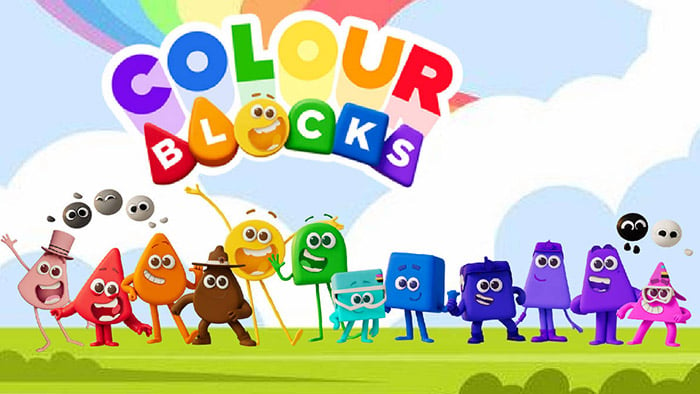
Colourblocks is a spin off of Alphablocks. It’s a story powered by colour theory, and it’s worrying how much I’ve picked up from this. For example, now I know a lot about CYMK printing and that Purple is an arsehole. Purple is an astounding arsehole – the royal colour, as he never stops pointing out to the various lesser colours. One day, Red is going to deck him, and who can blame her. You are nothing without me and Blue, Purple. NOTHING.
The structure is short stories plus songs, of which Brown’s regularly moves me to tears. Brown eminates real peppy lesbian scout leader energy – but her optimism but also a sense of dread underlying it, as she heads out, not exactly knowing where she’s going. “Me too, Brown, me too”, I think, weeping into Iris’ Wheetabix . It’s admirable how they wrestle with cliches and subtextual negative stereotypes of the colours, most notable in Pink’s episode where his song circles spends three minutes exclaiming “PINK IS FOR EVERYONE!” stopping just short of actually saying “not just for the girls and the gayyyyyysssss!”
But really, it’s a show whose driving force is turning “gee, there’s so many ways you can mix brown!” into stories, which is pretty astounding they pull it off. I’d highlight the black and white and grey focus episodes – black/brown/grey don’t speak, and so you can almost see the animators straightening up, realising they can actually show what they learned in school instead of illustrating another monologue about the divine right of kings from Purple. Still – for all the educational value, I am wondering why my three year old daughter needs to know about CYMK printing. A number of artists I’ve worked with don’t know enough about CYMK printing.
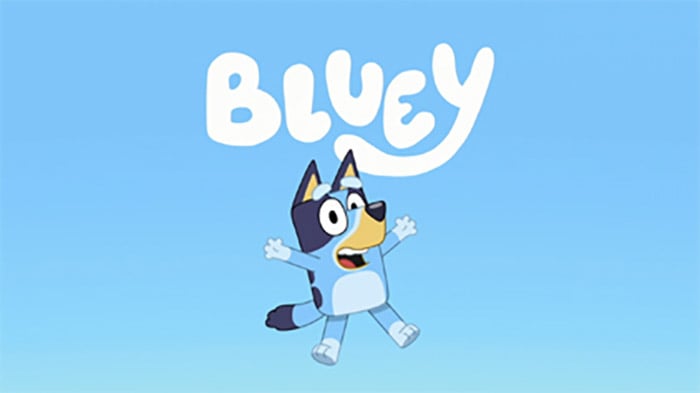
Everyone loves Bluey. We haven’t gone in that hard, but certainly enjoy it… which actually what worries me. Bluey’s charming, perfect portraits of family life seem a bit too enjoyable for adults. Like, it’s a smart decision to suck up to us, as we have the remotes, but I think if you were really aiming to entertain kids’ wild brains you should end up with something which was almost literally unbearable for adults.
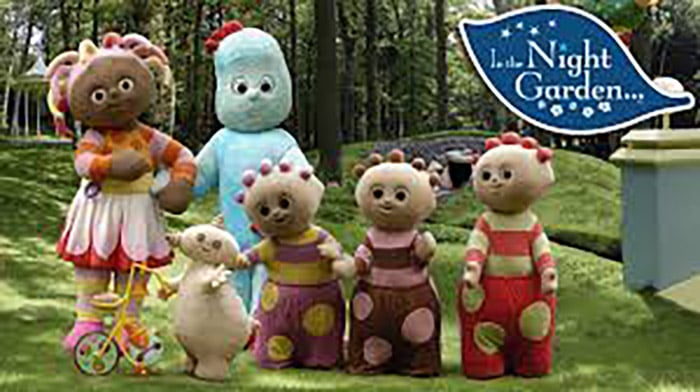
So, yes, I like the Night Garden. This is strictly speaking not true. It’s not about liking. I stared at the Night Garden. Past tense here. It was the first TV that was part of Iris’ rituals, but we’ve retired it, not least because Chrissy will throw the TV out the window rather than ever see it again. It lives with me. I’ve researched it. It’s what The Guy Who Made Up TellyTubbies did next, and clearly cost way too much while still being really shoddy. It’s shot on a bunch of different sets, and composited together. In reality, Makkapakka is about twice the hight of anyone else, which is a petrifying image when you realise he’d loom over you as he relentlessly tries to wash your face.
There’s a lot unsaid in the Night Garden, and the gaps nag at me, an abscess of meaning your mind tries to fill. I suspect all parents have at least some: everyone wants to know why IgglePiggle is alone on that boat. Everyone knows it’s not good. However, I went native, feeling like some kind of kiddy-tv-show Thomas Aquinas. For example, I’m pretty sure the Ninky Nonk doesn’t have a soul. Every other creature in the garden – from Makkapakka to the Pontepines – cause music to play when they go across. When the out of control train of the Ninky Nonk passes, only silence. Why is the Ninky Nonk greeted with a cry of “Oh no! Not the Ninky Nonk!” when it arrives. What has the Ninky Nonk done? Does its unamed sins have anything to do with its lack of soul?
So yeah. I’ve watched this too much. I reached a point where I wanted to start reviewing each episode on my socials as it aired. I even considered a podcast. I started being happy when certain children appeared in the opening – the kid who does the huge grin, the one who looks like they’re going to grow up and be a member of supergrass, etc. It’s a 00s show, so there’s a lot I frown at – IgglePiggle needs siginficantly better understanding of consent – but it’s just feral, and that stuck with me, while I wonder about the endless passive-aggression of the Pontepine/Wottingers and the distant untouchable perfection of the Haahoos.
Put it like this: it’s the only show here which I’ve started a game design inspired by, which is basically In The Night Garden meets Melancholia.
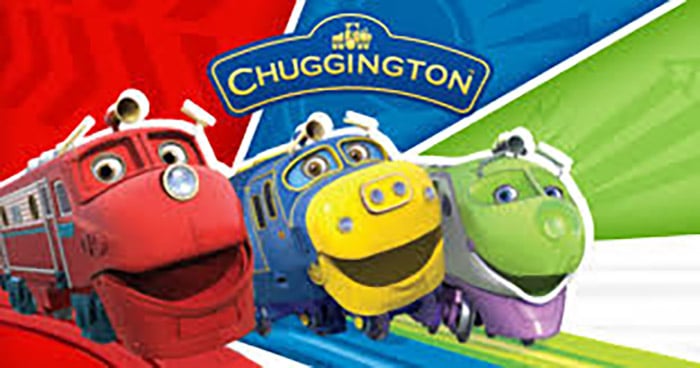
Chugginton is essentially, a remixed steroidal Thomas The Tank Engine tale of talking trains. Impossible for me to watch, because the trains all call each other “Chuggers” which sounds like a euphemism for compulsive masturbators.
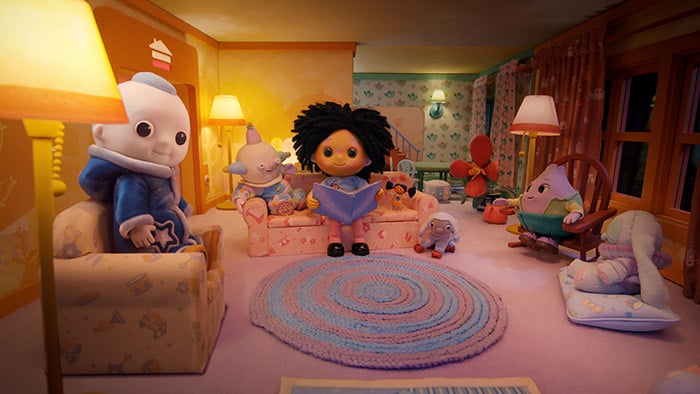
Moon & Me is basically a softer-edged, less abrasive and less “Er… Iggle Piggle, calm the fuck down” version of the Night Garden, which makes sense, as it’s the project the guy who did the Tellytubbies did after he did In The Night Garden. The main downside is that any time I watch it I start saying “onions!” uncontrollably, and C doesn’t need any more reasons to divorce me.
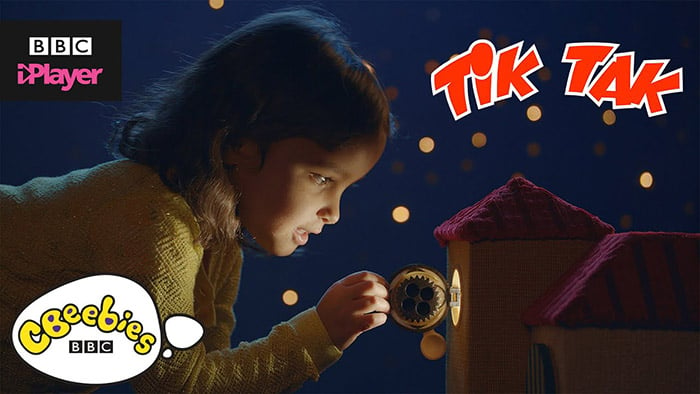
Tik Tak is The Fast Show for the under 2s.
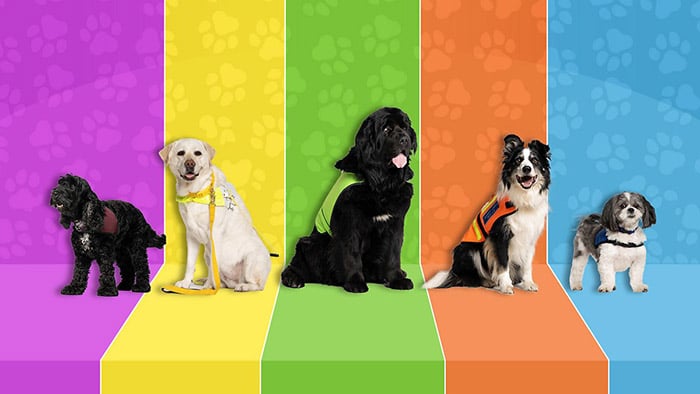
Dog Squad is a live-action show interspersed with little bits of animation, which basically shows how the whole welfare state in Scotland has been replaced by five intrepid dogs – and, worryingly, seems to be going pretty well. Kika is MVP, but all four of the dogs are great. A little worried that Tink is constantly described as having “Big Dog Energy”, which I suspect means someone in BBC commissioning doesn’t know what it’s referencing.
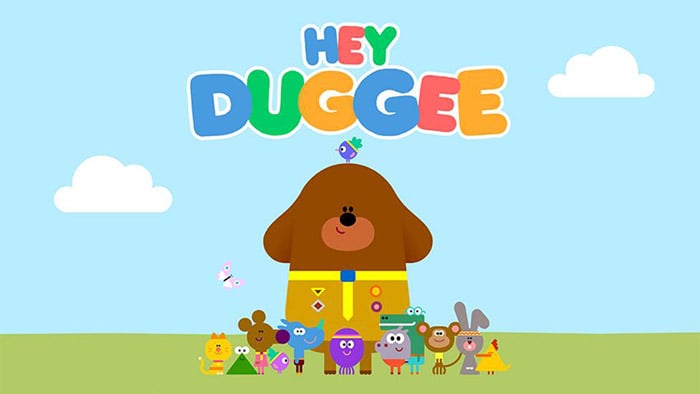
In Hello Duggee Anthropomorphic kids of various archetypes go to daycare where a dog looks after them, in a whirlwind of animation. Honestly, this is great, and one a creative can unpack lessons from – its choices in its animation style (absolutely rock solid, but hyper-stylised, elements regularly reused, clearly 00s-Flash-influenced) mean that a striking array of variety can be created. That it’s “easy” to do more stuff means you can do more stuff. Use and re-use your budget wisely.
Also, the Toothbrushing song is the only way we can make Iris do her teeth, so thanks for that, Squirrels.
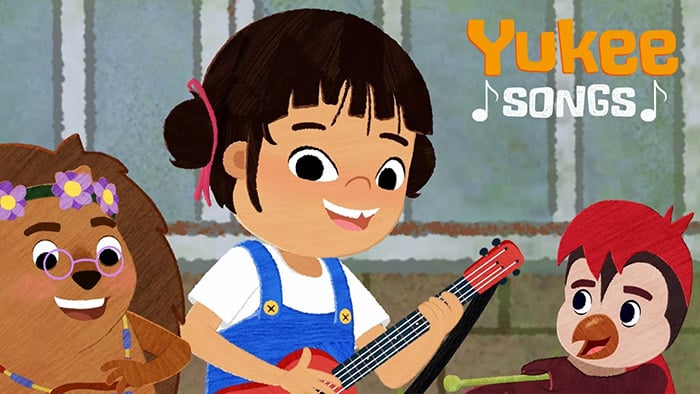
Yukee show here which I could most easily imagine my friends working on. An Irish-Chinese Girl goes into her garden and makes music with her many animal friends. While I think doing two episodes in a row with weather creating a rhythmic pattern is a bit of a cop out early on, it really just explores creativity with a string of bangers and excellent guest stars. On my birthday, I watched an episode to discover that Lauren Laverne was as a presenter animal of some kind, and she sung a song – which meant that for the first time in over 20 years, I heard her sing something new. It was a gift. Thanks, Yukeee.
That said, there’s one episode whose subtext is a WHAT!?
Yukee comes to the garden and is a bit sad, as her gran has gone for a long trip to China. Then the Fox finds something in the junk. Eventually, Yukee realises it’s a traditional Chinese musical instrument which her gran used to love playing. So they restore it, and then they play a lovely song about missing her gran when she’s away.
Your gran is dead, Yukee.
Mum didn’t even wait a day to throw her instrument in the bin.
I posted a selection of answers from the AMA McKelvie and I did over at the League of Comic Geeks last time, but had some more I wanted to highlight here too. There’s more in the link as well. We just kept on typing.
Looking back on your Iron Man run, do you have any regrets? Are there any villains that you wish you could’ve used but didn’t get the chance to? Any themes you wanted to delve more into?
I’m going to say this, and I don’t want you to think it’s me actually being full of woe and anger. It’s a fun run.
I should have quit the second my original idea for the run (the story which ended up becoming Fatal Frontier – though I was doing a more hard sci-fi take on the material ) had to be killed so Iron Man could join the Guardians of the Galaxies. I didn’t (and there was a string of other bad stuff before issue 1) because I figured I could handle it – my career was mainly about dealing with sub-optimum situations and making them sing.
It never sang. I worked as hard on Iron Man as (say) Young Avengers, but just so much less of what I was hoping for ended on the page. It was a lot of work for a book which was “just” fun.
If I had a wish… I wish I got to the third act? The core of the Superior Iron Man that followed me was my idea, and was part of what I was working towards as part of Rick’s AXIS event. I’d have gone to a similar place (though different execution ). There was some really beautiful stuff with Arno at the end of it, which would have set him up in a place more akin to IRON MAN 2020.
But in reality, it was actually probably best I got out. I left to do Darth Vader, which is probably the single most commercially successful bit of Work for hire comics I ever did, and one of the most artistically successful ones too.
I’m not good at quitting, but sometimes it’s better to.
How do you go about taking a core of an idea (i.e. the ‘if the superpowers fight everything will die’ of TPF or ‘what if there was still a part of you trapped in the fantasy worlds of your youth’ of DIE) and expanding that out into a full story and world? I have a lot of ideas I’ve been ruminating on for a while, but I can never figure out how to create a story that will explore those ideas to their fullest. I’m very much a character writer and am really struggling with plotting.
This is a real essay question, and I’m not going to be able to do it justice, even if I ignore all the other questions and just spend all my time answering this before I crash out.
Your answer actually did surprise me – I was reading, and presuming I knew where you were coming from, and the last end up-ended me. I was presuming you were an idea writer or possibly a world-builder writer, and having trouble working out how to develop that. My answer would have been something which I heard Marjorie Liu describe – that Monstress was hard for her until something clicked. She had all this stuff… but no story. But she realised she needed eyes to see her world – Middle-earth doesn’t really exist until Frodo. The character is the vector to explore the material. You got nothing until you have character.
(Dig out the 2 IDEAS DON’T BLEED Episodes with Si Spurrier recently, and Matt and Si talked about Idea vs Character writers, and how idea writers are often brits)
So for me when I get a pure idea like you describe, that’s the step – I got the idea, which is driving it. I had the idea for Once & Future forever – Arthur as the Mummy – but when I had to develop it, my first step was “Okay – who’s my Indiana jones, and why do I want to write about them?” And I realised I hadn’t written about a grand/grandchild relationship, or explored my own relationship with my spiky gran, or my feelings about being a working class kid who’s gone to university, while she came from a very different place, etc.
The second I had the character, it started suggesting scenes (Where does she live? An old person’s home, as she doesn’t want to be in the way – she doesn’t need to be there, but she’s so stubborn she doesn’t want him to even HAVE to think about her. So now she has to break out every time she goes on a mission, etc).
So leading back to you, being a character writer having problems with this is a bit of a surprise. What do characters want? What stops them doing it? What will they do to get it? That’s your plot. Plot for me is just a device to reveal character.
And don’t worry about exploring it to the fullest. You’ll never get that. Start plugging things in which interest you, because (much like writing for artists) if you’re not engaged, no-one will be.
What inspired you to do the pages at the back for The Power Fantasy? Like outside of the book itself, you’re working overtime on coming letter pages, artist spotlights AND A WHOLE PAGE OF FINE PRINT? Why?
I used to be a journo/critic, so I’m always into turning anything into a micromagazine. If you look at all my creator owned singles, you’ll find a lot of backmatter in all of them, changing shape depending on the nature of the book. I’m not someone who naturally buys singles, leaning towards collections, so part of me is always thinking “How could I make ME by this single? How can I justify it and make it feel like something absolutely essential and its own thing?”
The letter will likely segue into a letters page or something else, I suspect, but I like having space we COULD have something in. Caspar has a short essay in 4 as well, and Rian wants to do one down the line.
The interview features are me thinking… house ads are great, and we should be helping one another more, but maybe it’ll be fun to do something MORE than just a house-ad. Hence the interviews.
The fine print was Rian’s idea, and nearly killed us getting the languages right 🙂 But as an ex-journo, cramming in more jokes in the fine print is very much my energy.
Given that your work’s generally inclusive and includes a diverse range of characters, how do you approach the prejudices and injustices of the past when writing a historical tale, especially if those aspects aren’t key to the plot (as they often are in Uber etc.)?
Re: The Past Being Hell. I mean, in some ways it’s like the present. What’s extraneous and exploitative? What could yo do, but don’t really NEED to do?
CW: Rape. Racism.
I didn’t use hard racist slurs in Uber, for example. We already know the Nazis are racist assholes. We know the US military is too. And the US. And everywhere. The one time I considered it was when writing Truman – who folks broadly know as a progressive on race (excuse my late night paraphrasing of a complicated position) but my research turned up that he used the N word in private regularly. That seemed something that was perhaps worth highlighting… but I decided (after talking to a consultant too) that it really wasn’t worth it. Most folks just wouldn’t know the historical thing I was doing – it’s just be a white guy saying it and a white guy writing it, for no real effect. Worth noting my position on a lot of things change across the years too – there’s an explicit rape at the opening in Uber which, when writing, I thought morally important to do. Now I look at it and shake my head – I could have made it clear exactly how many people were raped on the eastern front without actually just showing it.
When writing the past, if you reduce characters just to the trauma of being that person in the period, it likely is a problem. In Uber, it’s telling the three main characters are all women, and their stories aren’t specifically about the problems of 1940s sexism.
The very short of it is you just think about it, and think about it seriously.
I really enjoyed sins of sinister, was there ever going to be a hellfire gala in the timeline? I’ve been thinking about the outfits and how amazing there would be.
Oh god. It would have been amazing. I can’t believe that Red Diamond Emma didn’t hold Hellfire Galas of increasing baroqueness for as long as the timeline held up – ringworld megastructures looping around white stars, with an endless catwalk of clones in perfect garments while Emma sits, watches, sips champagne and ejects anyone whose outfits are subpar into the void…
- Divining Comics reached The Wicked + the Divine 14, the re-mix issue constructed from panels in the previous issue. The issue was a bit extra, as are these annotations, which actually tracks down where each image actually came from in the comic. Cripes.
- I had to love Rowan Rook & Decards Black Friday sales, where they didn’t didn’t reduce the prices at all and in some cases, increased them a bit. There’s many reasons I wanted them to publish DIE RPG, but this sort of thing is certainly in the mix.
- I felt that I was haunted by LeGuin this week – she’s turned up all over the place. The timing for this Humble Bundle was part of it – centering around her Earthsea books, but with a whole lot more. If you’ve never read LeGuin, your life is the poorer for it, and you should grab this immediately. My LeGuin spiral was prompted by finally actually reading Those Who Walk Away From Omelas, which – despite me already knowing exactly what it was about, obviously – absolutely devastated me, and I’d likely have written about the whys of it in here if I hadn’t already written a couple of thousand words on kids TV.
- I was researching Frank Franzetta this week, which was a lot of fun. Here’s a short video of him, tuxed-up, giving some advice to artists specifically and creators generally. It starts specific and then becomes more of the “Why the hell you even doing this for, you bozos” angle.
- It was apparently the 26th anniversary of the release of Thief: the Dark Project. Here’s Liz Ryerson’s piece she wrote about it on the 20th anniversary, which is a lot. Fascinating game.
- Got this from Rascal.news’ newsletter. Interesting piece looking closer at the “people prefer AI art” thing that went around, unpacking what it actually proves in detail. The stuff where it segues over to the poetry is especially strong. “One interesting possibility raised by both Porter and Machery’s paper and Alexander’s experiment is that people have trouble distinguishing between human-authored and A.I.-generated works because they’re looking for the wrong things. As models get more sophisticated, qualities like “surprise” and “difficulty” and “weirdness,” with a handful of exceptions (e.g. around hands and fingers) are more likely to indicate a human author than an A.I. model. I think this is counterintuitive to many people, especially given how quickly models have advanced in the past five years, and it may take humans a while to catch up with this fact.”
- After listening to the Off Panel end of year podcast which included Joshua Williamson, I found myself back at the very long interview Harper ran between Joshua and me about event comics when he was doing Dark Crisis and I was doing Judgement Day. I think it’s a strong thing in terms of showing perspectives at this stuff, and chewing over where it’s led us both after it.
- Fresh in the Interview With A Vampire room, Lin Codega argues that a writer room is like an RPG (a bit) and how that you can bring those skills over to improve your games.
- This TERF/Gender Critiical primer is a strong one for those who need a little more context to all this.
Weird week. Dragomeet at the weekend was excellent, as demonstrated here…
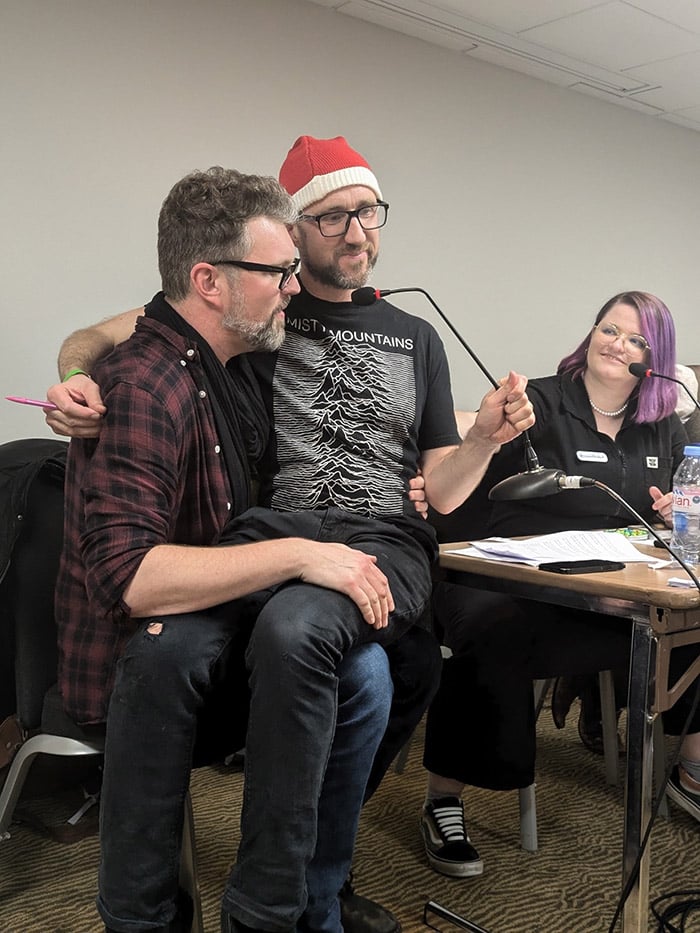
…but I woke up this morning on Monday, and found my to-do list was all crossed out. Weird. Been a while.
Obviously, it meant that I wrote a new to-do list. But I had the space to actually decide what to do, rather than have it firmly dictated by what needs to be done instantly. This meant turning back to the real work – The Power Fantasy and going back to a script for Stephanie I left 75% complete, but needed to do more research for a 5 page sequence in the middle (a process that left me nosing around student accomidation problem sites for major cities in the UK). To give you an idea about how derailed my work has been in the last couple of months, I handed her the rest of the script when I was at NYCC – as in, a month and a half back. That’s ludicrous. In the end, the work took me a day, but I was unable to really get the space to do that day until now.
Thankfully, I’m still ahead of Caspar here – he’s at work on issue 6, meaning I’m working on issue 7 and 8 simultaneously. They’re linked a little more than usual, so it’d be good to have more of the structure of the latter in time for the former. It’s also, like all TPF, hard. I’ve been at it for a couple of days, and as you can see by the high quality (or at least number) of posts on Blue Skies, I’ve certainly been procastinating. I’ve been posting about procastinating.
Which is a solid bit.
Hell, I brainstormed a whole RPG structure with a friend this morning rather than untie a narrative knot. I’m also aware this is all part of the process – not thinking is thinking about it, and thinking about it is a reiterative digging in on the material, getting closer and closer until it sparks something else.
Also, I have ADHD, so panic will help at some point, I’m sure.
Speak soon.
Kieron GillenBath
4.12.2024
